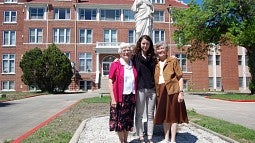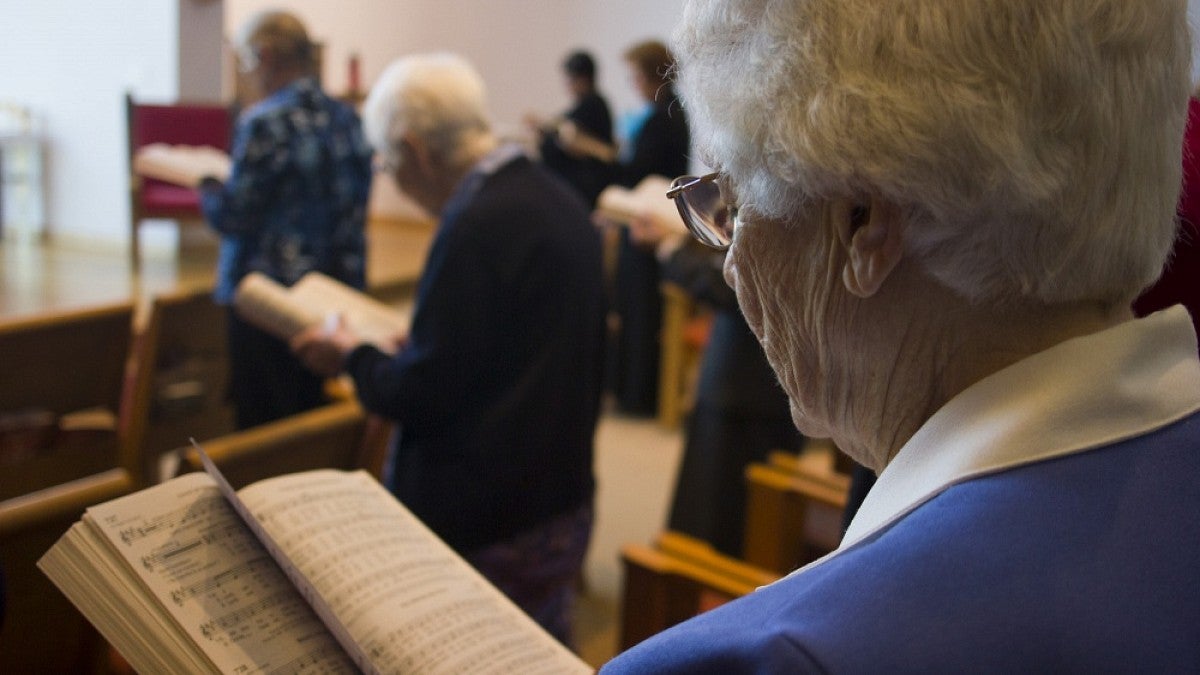For the last two years, Emma Decker has been going on some unusual spring break vacations. While most college students her age have spent their weeks of freedom on road trips and down time, Decker has taken up temporary residence with the Sisters of the Holy Spirit and Mary Immaculate at a convent in San Antonio, Texas.
Decker is a senior journalism student in the Robert D. Clark Honors College. Like many honors students, she struggled to find a thesis topic that interested her. She didn’t want to do a 90-page research paper — she wanted to make an audio story, just as her classes in the School of Journalism and Communication had prepared her for.

Then over dinner one night, her parents mentioned Sister Jo and Sister Marion Murray, Decker’s two great aunts. They emigrated to the U.S. from Ireland in the ’50s and joined the convent as teenagers. When Decker asked them if she could spend a week in the convent with them, the two immediately prepared a room for her.
Decker is among a select few journalists who get to tell such an in-depth story about monastic life. “They really opened up their homes and their hearts and their memories to me,” Decker says.
The Sisters of the Holy Spirit and Mary Immaculate have quite a story to tell. The convent’s establishing mission was to educate African-Americans from the South after the Civil War. Since then, the nuns have devoted their lives to providing education to minority groups. Decker’s great aunts, the Murray sisters, helped students during the desegregation movement of the mid-1950s, and they now run a school in San Antonio to help disadvantaged youth get their GED diploma.
When students think of the thesis process, or research in general, they often think of lab studies or hours poring over books in a library. Decker used a different approach. She spent her time interviewing nuns at the convent and participating in everyday life to learn their struggles, joys and values. “It was an incredible experience that showed me a whole new way of life,” she says.
Her project is more than just a feature audio story — it’s historical preservation. Decker says younger women aren’t as attracted to vocational life as her great aunts were decades ago. Most of the nuns at the San Antonio convent are elderly Irish immigrants like them. The sisterhood’s numbers have slowly dwindled over the years, and Decker wants to ensure that their heritage and good deeds aren’t forgotten.
“Their stories are literally and figuratively dying out, and I want to tell them before they’re gone,” she says.
When searching for a primary advisor to help her complete her thesis, Decker looked for professors familiar with both the immigrant experience and complex narrative storytelling. Torsten Kjellstrand, a Swedish photojournalism professor in the journalism school, turned out to be the perfect fit. He even did a story on monastic life during his time spent as a reporter with The Oregonian. She recommends that other students find a primary advisor who taught a class that they particularly liked or with whom they have built a close connection during their undergraduate years.
She also has some advice for those who haven’t yet pinned down a thesis topic or are unsure about the one they’ve been considering. “Make it work for you,” she says.
As a journalism major, publishing an audio story is a perfect portfolio piece, something that Decker can use to show future employers.
“I’m a journalism major, so doing a big research study just wouldn’t have made sense,” she says. One benefit of the thesis is to give honors students a step ahead as they graduate and enter the workforce or apply to graduate programs.
Decker is now busy transcribing hours of interviews and fitting the pieces into a coherent story. Despite the long hours, she says she looks forward to the time she gets to work on her project. “If you’re excited about it and it’s something you’re passionate about, it makes the process so much more enjoyable for you,” she says.
But while she’s loved working and living with the nuns, Decker has no intentions of joining a convent anytime soon — “not for permanent residency, anyway.”
—By Derek Maiolo, Clark Honors College multimedia communications assistant


